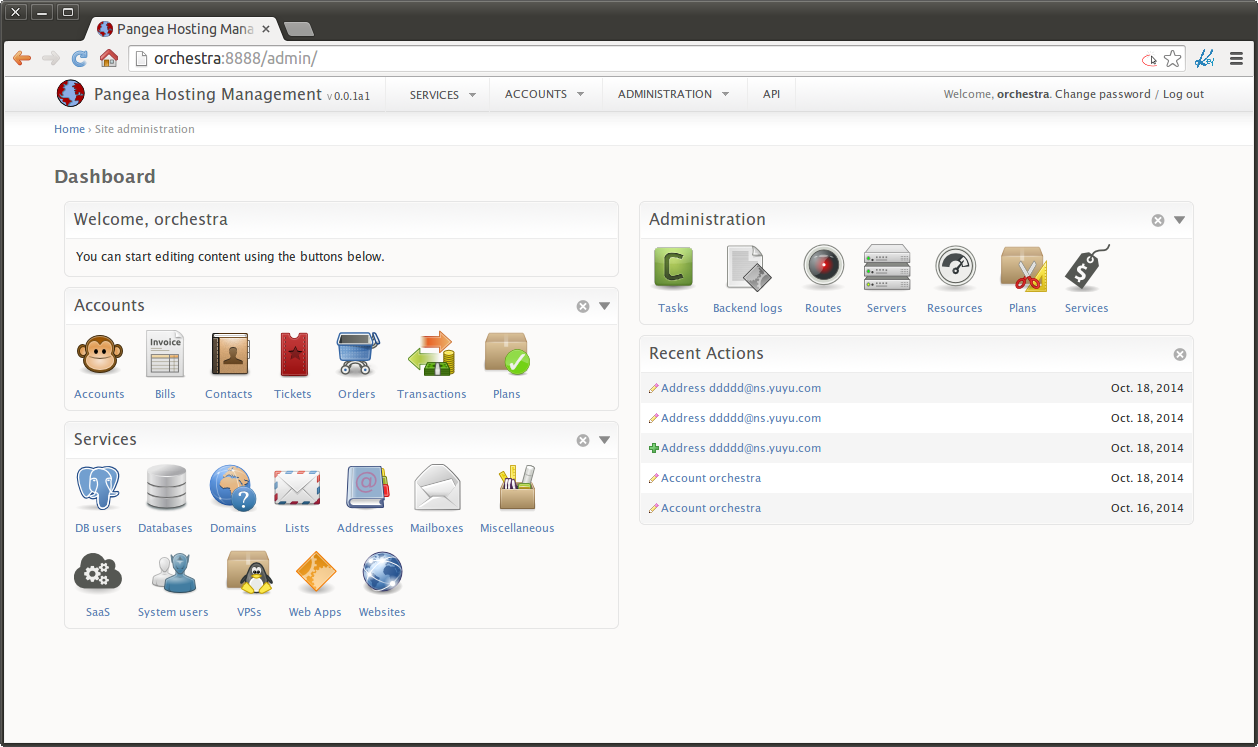| docs | ||
| orchestra | ||
| scripts | ||
| .gitignore | ||
| INSTALL.md | ||
| LICENSE | ||
| MANIFEST.in | ||
| README.md | ||
| ROADMAP.md | ||
| setup.py | ||
| TODO.md | ||
![]() This project is in early development stage
This project is in early development stage
Django Orchestra
Orchestra is a Django-based framework for building web hosting control panels.
Motivation
There are a lot of widely used open source hosting control panels, however, none of them seems apropiate when you already have an existing service infrastructure or simply you want your services to run on a particular architecture.
The goal of this project is to provide the tools for easily build a fully featured control panel that is not tied to any particular service architecture.
Overview
Django-orchestra is mostly a bunch of plugable applications providing common functionalities, like service management, resource monitoring or billing.
The admin interface relies on Django Admin, but enhaced with Django Admin Tools and Django Fluent Dashboard. Django REST Framework is used for the REST API, with it you can build your client-side custom user interface.
Every app is reusable, this means that you can add any Orchestra application into your Django project INSTALLED_APPS strigh away.
However, Orchestra also provides glue, tools and patterns that you may find very convinient to use. Checkout the documentation if you want to know more.
Development and Testing Setup
If you are planing to do some development or perhaps just checking out this project, you may want to consider doing it under the following setup
-
Create a basic LXC container, start it and get inside.
wget -O /tmp/create.sh \ https://raw2.github.com/glic3rinu/django-orchestra/master/scripts/container/create.sh sudo bash /tmp/create.sh sudo lxc-start -n orchestra -
Deploy Django-orchestra development environment inside the container
wget -O /tmp/deploy.sh \ https://raw2.github.com/glic3rinu/django-orchestra/master/scripts/container/deploy.sh cd /tmp/ # Moving away from /root before running deploy.sh bash /tmp/deploy.shDjango-orchestra source code should be now under
~orchestra/django-orchestraand an Orchestra instance called panel under~orchestra/panel -
Nginx should be serving on port 80, but Django's development server can be used as well:
su - orchestra cd panel python manage.py runserver 0.0.0.0:8888 -
A convenient practice can be mounting
~orchestraon your host machine so you can code with your favourite IDE, sshfs can be used for that# On your host mkdir ~<user>/orchestra sshfs orchestra@<container-ip>: ~<user>/orchestra -
To upgrade to current master just
cd ~orchestra/django-orchestra/ git pull origin master sudo ~orchestra/django-orchestra/scripts/container/deploy.sh
License
Copyright (C) 2013 Marc Aymerich
This program is free software: you can redistribute it and/or modify it under the terms of the GNU General Public License as published by the Free Software Foundation, either version 3 of the License, or (at your option) any later version.
This program is distributed in the hope that it will be useful, but WITHOUT ANY WARRANTY; without even the implied warranty of MERCHANTABILITY or FITNESS FOR A PARTICULAR PURPOSE. See the GNU General Public License for more details.
You should have received a copy of the GNU General Public License along with this program. If not, see http://www.gnu.org/licenses/. Status API Training Shop Blog About
